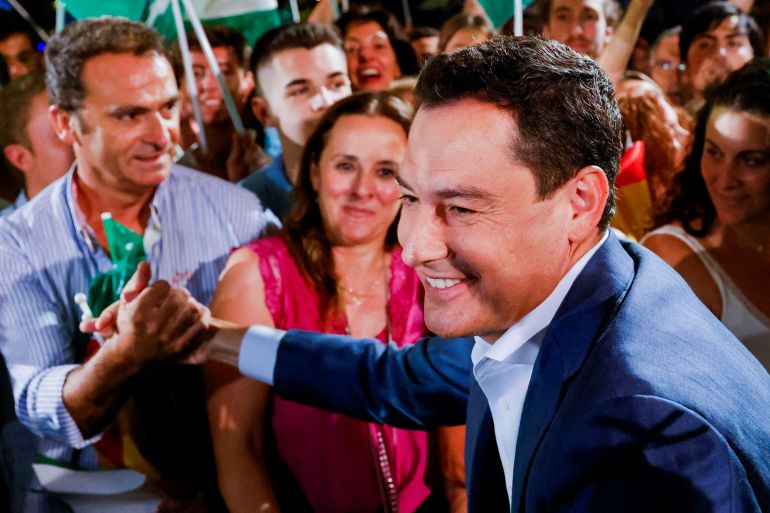Spain’s conservative People’s Party secures majority in Andalusia
The People’s Party secures 58 seats in Andalusia’s parliament, blocking out the far-right Vox party.

Spain’s conservative People’s Party (PP) has secured an absolute majority in regional elections in Andalusia, blocking out the far-right Vox party.
The PP is headed by Juan Moreno who has kept his presidency of Andalusia’s regional government by securing 58 seats in its parliament, three more than the 55 needed for an absolute majority.
Keep reading
list of 3 itemsSpain debating plan to offer paid menstrual leave
Spain to reform secret services after phone-hacking scandal: PM
That was up from just 26 seats won in 2018 when Moreno came to power via a coalition that ended more than 30 years of Socialist rule.
The commanding victory will ensure that Moreno does not have to rely on Vox, which said it would support Moreno if it is given a share of the government.
Moreno led a right-centre coalition government for the previous four years after right-wing parties ended the Socialists’ 36-year hold on Andalusia.
He was credited for running a successful campaign on a moderate platform, which included the defence of gender equality laws that Vox wants to strike down.
“We have made history,” Moreno told a large crowd in Seville. “[But] I want to start this new stage with humility. Because we in the PP Andalusia have lost many elections and are well trained in accepting results. With this dominant win, we want to remain serene and humble because that is our form of politics.”

The Socialists of Prime Minister Pedro Sánchez were unable to rebound and slipped from 33 seats in 2018 to 30.
More than 6 million people had the right to vote in the election, which the PP hopes will be a signal of what is to come in national elections that will have to be held before the end of 2023.
Sánchez will be under even more pressure after his government has struggled to deal with the impact of rampant inflation that is threatening to dampen economic recovery from the pandemic.
It was the first election since Alberto Núñez Feijóo stepped in as the PP’s leader in April after his predecessor was removed following an ugly public spat with another party heavyweight, the outspoken and combative Isabel Díaz Ayuso, the regional leader of Madrid. Feijóo’s political style of projecting a calm, yet serious persona focused on good governance meshes well with Moreno.
Vox had hoped to become a dominant force in the region where it won its first representation in a legislative body, but it could only increase its 12 seats from 2018 to 14 now. Vox entered a regional government for the first time earlier this year after the PP needed it to remain in charge in Castilla y León.
The far-left parties – corresponding to the United We Can party that is in a coalition with the Socialists at the national level – won just seven seats, compared with the 17 it had.
The centre-right Citizens party, which had been the junior member of Moreno’s government, continued its demise as a political force in Spain after failing to win a single seat four years after grabbing 21.